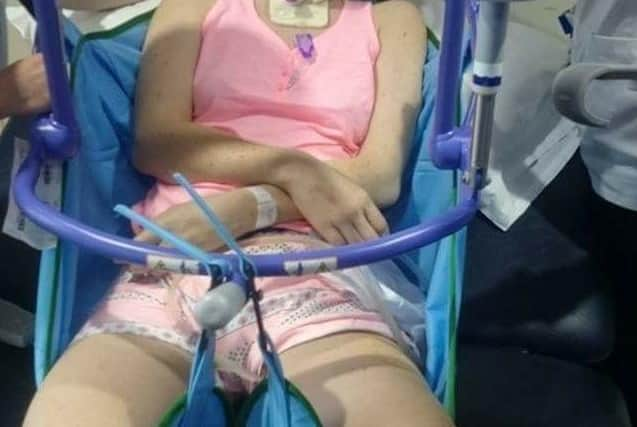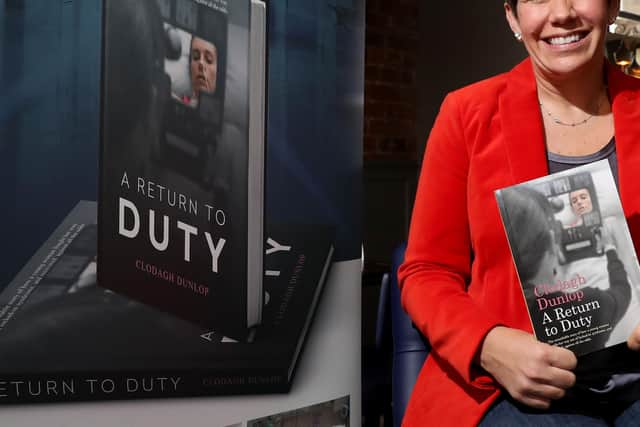Clodagh Dunlop: Breaking free from locked in syndrome


You would have to have a hard heart to read Clodagh Dunlop’s book, A Return to Duty, without at least coming close to shedding a few tears.
The profoundly moving memoir tells the remarkable story of a fighting-fit policewoman from Magherafelt, who was left paralysed and spent three months locked in her body following a devastating stroke.
Advertisement
Hide AdAdvertisement
Hide AdClodagh’s life took a dramatic turn four years ago, when, at the age of 35, she had a brainstem stroke which left her fully conscious but unable to communicate, apart from blinking. She had locked in syndrome, which affects around one per cent of people who have a stroke.


It is a condition for which there is no treatment or cure, and it is extremely rare for patients to recover any significant motor functions. About 90 per cent die within four months of its onset.
Although Clodagh does not have full use of her right arm and leg, she has defied her prognosis of spending the rest of her life in a wheelchair.
Her determination and hard work have also seen her qualify as a detective in the PSNI after returning to the service 18 months after her stroke.
Advertisement
Hide AdAdvertisement
Hide AdClodagh, who has campaigned tirelessly to raise awareness of locked in syndrome and has lobbied government to introduce new legislation to reshape stroke services, says that writing the book was a difficult yet cathartic experience.


“I always knew I wanted to write my story but it has taken me time to feel ready to talk about some of the very personal aspects of it. I want the world to know the reality of the struggle when you lose the ability to communicate.
“Locked in syndrome is a truly horrifying ordeal and I was convinced many times that I was going to die in hospital because I couldn’t communicate the fact that I was overheating or in pain.
“It was only because my partner Adrian noticed I could blink that we were able to work out a way of communicating until I could learn to make a sound again.’’
Advertisement
Hide AdAdvertisement
Hide AdThe idea of a young, healthy woman stricken in this unthinkable way, is devastating and Clodagh’s book is a searingly honest account of this rare and terrifying condition.
Trapped in her body and mired in frustration, Clodagh finds joy in flights of imagination and memories of blissful holidays.
There are brutally sad moments, but joyous ones too - not least Clodagh’s stoicism and monumental effort in rehabilitation.
And the shattering blow of her illness precipitates many expressions of kindness and love; from her partner Adrian, her sister Diane, her parents and the nursing staff who looked after her.
Advertisement
Hide AdAdvertisement
Hide AdClodagh added:“Writing the book made me laugh and cry as I relived the experience and I will be delighted if this book can help anyone who has a friend or family member going through a similar situation to understand what is happening.
“I know how fortunate I am to enjoy the quality of life that I do, because I know this is not the case for many survivors of locked in syndrome, and that is thanks to Adrian and my family and the dedication of the healthcare workers who helped me learn to breathe, talk and walk again.”
Clodagh reveals in A Return to Duty that in the middle of a seizure she took at A&E, medical staff didn’t recognise her symptoms with a nurse repeatedly asking her what drugs she had taken.
“I feel that there is still much to be done in terms of education about stroke in younger people.
Advertisement
Hide AdAdvertisement
Hide Ad‘‘Brainstem strokes can be difficult to diagnose but my symptoms were missed and perhaps action could have been taken earlier to prevent it becoming such a serious situation.
“I found it very difficult to stay positive when during my rehabilitation I was asked by healthcare staff if my family had selected a nursing home for me. I was told to expect to spend the rest of my life in a wheelchair and, while I’m delighted that isn’t the case, I believe that my determination has helped immensely in my recovery.”
Clodagh, who was a keen runner until her illness, says that proceeds from her book sales will fund advanced treatments in America to improve her mobility.
“I have right sided weakness as a result of my brainstem stroke and walking is still a challenge. My burning desire is to improve my walking and my long-term goal is to run again. I am not giving up on that dream just yet!
Advertisement
Hide AdAdvertisement
Hide Ad“I’m looking at specialist residential rehabilitation centres in the US costing several thousand pounds a week, where everything from diet, to splints, specialist massage of muscles and physio with state-of-the-art technology, would be tailored to my specific needs.
“I’ve also investigated cutting-edge technology which would also help promote muscle rehabilitation in my leg.
‘‘That would help me walk with more stability while a specialist hand system would allow me to open and close my right hand while strengthening the muscles.
“However, these devices cost over £10,000 to buy and several thousand pounds a year to maintain, alongside the cost of the intense physio I continue to need.
Advertisement
Hide AdAdvertisement
Hide Ad“I know I’ll never be 100% back to full fitness but I am determined to be the best version of me I can be.”
All too often, locked in syndrome remains undiagnosed, patients written off as lost causes when they are all the while aware of their condition, just unable to say so. Clodagh did something almost unheard of: she recovered. Her memoir is an unsentimental, unself-pitying affirmation of life, illustrating poignantly how life can change in the blink of an eye.
l A Return to Duty is available to buy at beatinglockedin.com for £9.99 and at branches of Waterstones throughout Northern Ireland.